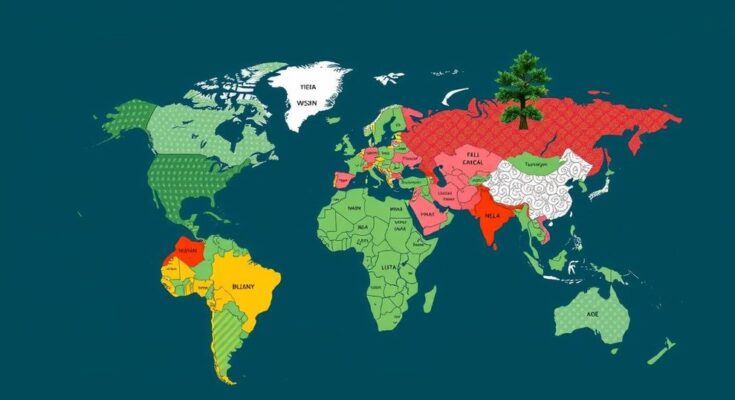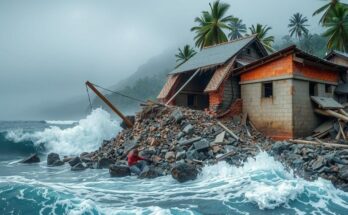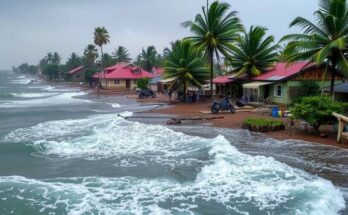Wealthier countries are initiating payments to poorer nations for damages stemming from climate change, epitomized by Christopher Bingala’s receipt of $750 after Cyclone Freddy devastated Malawi. Approximately $720 million has been pledged for loss and damage funding, although experts warn it may be insufficient. At COP29, discussions are ongoing regarding the financial responsibilities of developed nations, with calls for broadened assistance beyond immediate disaster recovery.
In March 2023, Cyclone Freddy devastated southern Malawi, leading to significant flooding that left many families, including Christopher Bingala’s, homeless. Despite his losses, Bingala received approximately $750 through a new compensation scheme aimed at addressing climate change-related damages. This initiative, termed “loss and damage” funding, was established as wealthier nations recognized their financial responsibility towards vulnerable countries impacted by climate crises. Thus far, around $720 million has been pledged to assist countries adversely affected by climate change, but experts caution that these funds may be insufficient amid worsening climate conditions.
At the COP29 climate summit in Baku, Azerbaijan, negotiations seek to quantify the financial obligations of developed nations towards developing countries as part of a broader climate finance strategy that includes loans and investments. Philip Davis, Prime Minister of the Bahamas, articulates the anticipation that economically prosperous nations will acknowledge their contributions to climate change and support those suffering its effects.
Cyclone Freddy’s impact extended beyond individuals to approximately 650,000 displaced persons in Malawi, illustrating the escalating humanitarian crises associated with extreme weather events. Bingala’s situation was dire; he and his family survived on limited resources until he received financial aid that enabled them to rebuild. The Scottish government initiated this funding as part of a pioneering effort to provide direct financial relief without stipulations.
The program in Malawi aims to serve as a model for broader systems to effectively allocate compensation for loss and damage linked to climate change, particularly for nations emitting minimal greenhouse gases. It is important to note that many residents of these low-income countries lack essential protections against environmental disasters.
The increasing frequency and severity of climate-related disasters are straining resources in already indebted developing nations. For instance, Davis noted that Hurricane Dorian significantly contributed to the national debt of the Bahamas. The $720 million committed to loss and damage funding will be managed by the World Bank, with comprehensive guidelines yet to be established regarding the distribution of funds.
There are calls for this funding to support more than just disaster remediation, seeking also to assist in the relocation of communities facing sea level rise and to preserve cultural heritage at risk due to climate impacts. As studies predict that the financial need for such funding will escalate to approximately $250 billion annually by 2030, it is crucial for developed nations to engage proactively. Prime Minister Davis warned that neglecting this responsibility could lead to profound consequences for the global community, highlighting the interconnectedness of climate crises.
In conclusion, the establishment of loss and damage funding represents a significant step towards accountability among wealthier nations in the context of global climate change. As developing countries confront unprecedented challenges, ongoing discussions and actions from affluent nations remain essential in supporting vulnerable populations and mitigating future crises.
The issue of climate change has resulted in increasingly severe weather patterns that disproportionately affect developing nations, which contribute minimally to greenhouse gas emissions. In response to this inequity, wealthier nations have begun to establish mechanisms for compensating poorer countries for the damages incurred due to climate-related disasters. This includes a historical commitment to fund loss and damage initiatives, recognizing the urgent need for financial support to rebuild communities and infrastructure devastated by climate events such as Cyclone Freddy in Malawi.
The initiative for loss and damage funding is an integral development in international climate policies aimed at promoting equity and responsibility among nations. As wealthier countries convene to finalize compensation frameworks, it is imperative that the allocated resources be adequately addressed to meet the escalating needs of developing nations battling the impacts of climate change. The commitment to assist these vulnerable populations will ultimately serve the global community by fostering stability and resilience in the face of unprecedented environmental challenges.
Original Source: www.kanw.com




